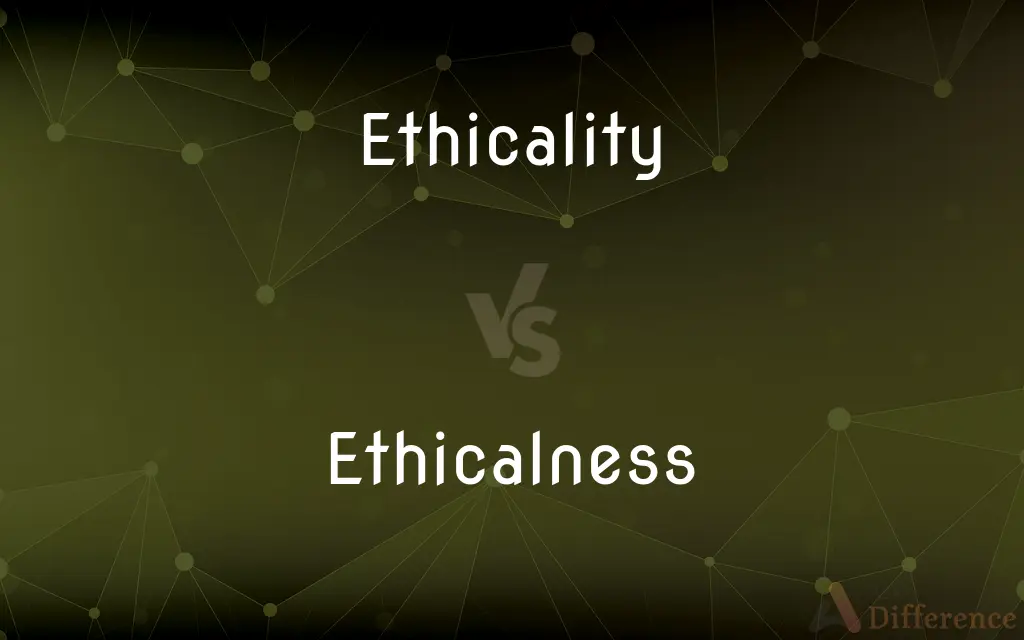Ethicality vs. Ethicalness — What's the Difference?
By Maham Liaqat & Urooj Arif — Updated on April 5, 2024
Ethicality and ethicalness both refer to the quality of being ethical, but "ethicality" is more commonly used in formal contexts.

Difference Between Ethicality and Ethicalness
Table of Contents
ADVERTISEMENT
Key Differences
Ethicality and ethicalness are nouns that describe the state or quality of being ethical, emphasizing adherence to moral principles. Ethicality, however, tends to be preferred in legal, philosophical, and professional discussions, highlighting the conformity to ethical standards within specific contexts. On the other hand, ethicalness is a less commonly used term and might be found in more general discussions about morality and ethics without a specific contextual framework.
When discussing the ethicality of a decision, one often refers to the alignment with established ethical guidelines or principles, particularly in areas like business, law, and medicine. This term underscores the importance of a structured approach to ethics. Conversely, when one refers to the ethicalness of a behavior, it might be in a broader, more universally moral context, without the implication of a structured set of guidelines or principles.
Ethicality often involves a deliberate evaluation process, considering various ethical frameworks and guidelines before reaching a conclusion about the ethical standing of an action or decision. This term implies a level of rigor and formality in ethical considerations. Ethicalness, while also concerned with the morality of actions or decisions, suggests a more inherent or intuitive sense of right and wrong, possibly without the explicit application of formal ethical principles.
In academic and professional discourse, the use of ethicality can signal a nuanced understanding of ethical theories and principles, indicating a sophisticated engagement with ethical questions. Ethicalness, by contrast, might be employed in a more general sense, appealing to a broad concept of moral rightness without necessarily delving into specific ethical doctrines or theories.
Despite these nuances, both terms ultimately aim to assess the moral dimension of actions, decisions, and behaviors, serving as important concepts in discussions about ethics across various fields. The choice between ethicality and ethicalness may depend on the context, the level of specificity and formality desired, and the speaker's or writer's preference.
ADVERTISEMENT
Comparison Chart
Usage Context
More common in formal, professional, and academic discussions.
Less commonly used, more general discussions of morality.
Implication
Implies adherence to specific ethical standards or guidelines.
Suggests a general sense of moral rightness.
Evaluation Process
Involves a structured, rigorous approach to ethics.
May imply a more intuitive understanding of right and wrong.
Common Fields
Law, business, medicine, philosophy.
General discussions about morality and ethics.
Formality Level
Higher formal and contextual specificity.
Lower formal specificity, broader application.
Compare with Definitions
Ethicality
Formal Contexts.
The ethicality of corporate policies is often scrutinized during audits.
Ethicalness
General Morality.
The ethicalness of helping others is widely recognized.
Ethicality
Legal Implications.
The ethicality of a lawyer's actions can impact their career.
Ethicalness
Intuitive Decisions.
Acts of kindness are often guided by a sense of ethicalness.
Ethicality
Philosophical Analysis.
Philosophers examine the ethicality of human actions in society.
Ethicalness
Broader Application.
Debates about ethicalness often include diverse moral perspectives.
Ethicality
Professional Discussions.
Medical ethics debates focus on the ethicality of new treatments.
Ethicalness
Less Formal Discussions.
Everyday conversations about ethicalness focus on personal morals.
Ethicality
Adherence to Standards.
Ethicality in journalism requires following strict guidelines.
Ethicalness
Universal Concepts.
Ethicalness in global cultures can vary but centers on common moral values.
Ethicality
Of, relating to, or dealing with ethics
An ethical treatise.
Ethicalness
Of, relating to, or dealing with ethics
An ethical treatise.
Ethicality
Being in accordance with the accepted principles of right and wrong that govern the conduct of a profession
An ethical act.
Ethicalness
Being in accordance with the accepted principles of right and wrong that govern the conduct of a profession
An ethical act.
Ethicality
Relating to or being a drug dispensed solely on the prescription of a physician.
Ethicalness
Relating to or being a drug dispensed solely on the prescription of a physician.
Ethicality
The state, quality, or manner of being ethical.
Ethicalness
(rare) The state or quality of being ethical.
Common Curiosities
Can a decision have ethicality without ethicalness?
In theory, a decision could adhere to formal ethical standards (ethicality) but be considered morally wrong in a broader sense (lacking ethicalness).
What is ethicalness?
Ethicalness describes the general state of being moral or ethical, without specific reference to formal guidelines.
Are ethicality and ethicalness interchangeable?
While they are similar, they are not always interchangeable due to differences in formality and context specificity.
How does one develop a sense of ethicalness?
A sense of ethicalness is developed through personal experiences, cultural influences, and moral education.
Is ethicalness subjective?
Ethicalness can be more subjective, as it relies on a broad sense of moral rightness rather than specific standards.
Can ethical standards evolve over time?
Yes, ethical standards, and thus notions of ethicality, can evolve as societal values and knowledge change.
Why is ethicality preferred in professional contexts?
Ethicality is preferred due to its implication of adherence to established, specific ethical standards or guidelines.
How is ethicality assessed?
Ethicality is assessed through structured evaluations against specific ethical principles or guidelines.
Are there specific fields that focus on ethicality?
Yes, fields like law, business, medicine, and philosophy often focus on the concept of ethicality.
How can understanding ethicalness impact daily life?
Understanding ethicalness can guide personal behavior and decisions based on a sense of moral rightness.
What role does culture play in ethicalness?
Culture significantly influences perceptions of ethicalness by shaping moral values and norms.
Why is discussion about ethicality and ethicalness important?
These discussions are crucial for navigating moral dilemmas and promoting integrity in various aspects of life.
Does ethicalness require a formal evaluation?
Ethicalness does not necessarily require a formal evaluation but is often based on a general sense of right and wrong.
What challenges arise in defining ethicality?
Challenges include varying ethical standards across cultures and the dynamic nature of ethical principles.
Share Your Discovery

Previous Comparison
Ingrain vs. Engrain
Next Comparison
Slave vs. MaidAuthor Spotlight
Written by
Maham LiaqatCo-written by
Urooj ArifUrooj is a skilled content writer at Ask Difference, known for her exceptional ability to simplify complex topics into engaging and informative content. With a passion for research and a flair for clear, concise writing, she consistently delivers articles that resonate with our diverse audience.
















































